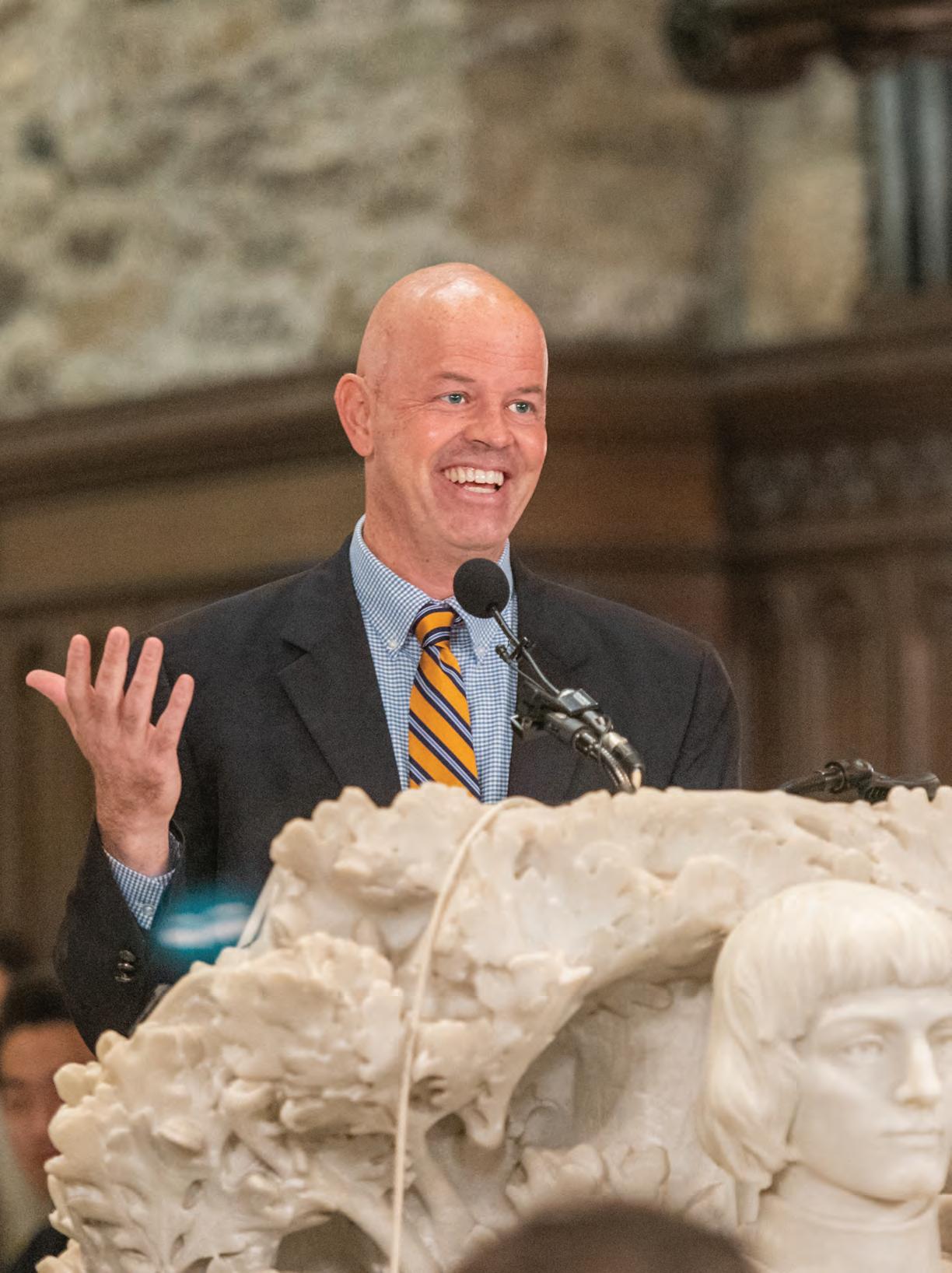
4 minute read
Chapel Talk
Where It Begins
Advertisement
Delivered by Joe Kremer
In the summer of 2018, Joe Kremer, our esteemed colleague and dear friend, was diagnosed with a rare form of brain cancer. Many people facing a similar prognosis would have grown angry and bitter by now. But Joe has chosen a different path — one of grace, wisdom, and humor. Especially humor. By sharing of himself so freely and so openly, he has made the scariest thing imaginable a little less scary. Most importantly, he has reminded us to appreciate what we have while we still have it. Even when that thing is brain cancer.
I am new to Gratitude as a movement, though I was raised to be appreciative of my lot in life. However, in the last fifteen months, I have become much more cognizant of the importance and power of being thankful.
I have brain cancer. For most, it’s a pretty tough sentence. I had no control over getting it, but it did force me to ask some pointed questions in the last few months. Why was my tumor located in my temporal lobe and not some other region with greater consequences? The temporal lobe affects language processing and memory, and as my very lovely wife has said, “Who would know there is a problem since you never remember what I told you to do and half of the stuff that comes out of your mouth is ridiculous anyways?”
Why was I able to walk down the hallways of the neurosurgical ICU the day after my surgery when so many who have brain surgery come out with severe mental and physical challenges that require months of rehab? Why is the most effective course of treatment for my type of cancer an oral chemotherapy with a history of very moderate side effects, or in my particular case, pretty much no side effects? All of these outcomes are happenstance, but these “it could be worse” moments have had a profound impact on my sense of gratitude.
I have become convinced that gratitude is a cornerstone of resiliency. If you appreciate the fact that “it could be worse,” then you appreciate the fact that your situation can be overcome more easily. There is an old adage that goes, “Life is 10 percent what happens to you and 90 percent how you react to it.” When something negative happens to you, ask yourself if it could be worse. If it could, you can and will bounce back more quickly. If you have a knee sprain and will miss a few games, focus on the fact that it could have been worse, such as a career ending ACL tear, for instance.
If you’re having to go for extra help during every office hour for every class, be grateful you have the opportunity to get that extra help in the first place. In the last fifteen months, I have had two brain surgeries and five surgeries to completely seal my scalp. It hasn’t been easy to walk around with a bandage on for most of that time, but I am “walking around,” at least, and know it could be worse. As a result, I bounce back much more quickly and trudge on. (Plus, no one rocks a gauze bandage on the top of his head and eight-inch scar on the side of his head like me. Am I right?)
Being grateful is not where it ends. It is where it begins. Express that gratitude. Don’t keep it in. Let it out.
I now let my good friends know how much they mean to me and end nearly every phone call or text message with “I love you.” Imagine what kind of community we would be if we could all express our gratitude more freely.
“Thank you for holding me accountable.” “I appreciate you wanting the best for me.” “Hey, I really liked your comment in class, it really made me look at that situation differently. Thank you.” “I appreciate and am really grateful for the leadership you have been showing at practice. Thanks for setting such a good example.” “Thanks for the nice note. I really appreciated receiving it.” “Thank you for sharing your pizza. I really appreciate it and didn’t have lunch today.”
I’ve found that I am a much happier person when I let others know how much they mean to me, but it took a pretty tough diagnosis to figure that out. And lastly, and perhaps most importantly, find a cause or organization that you can get behind. Then let your thoughts become words and your words become actions and change someone’s life for the better.
Don’t wait for brain cancer or some other life altering event to truly appreciate the power of gratefulness. Put it to work making your life and the lives of those around you better now.
Thank you, Mr. Fisher. I truly appreciate the opportunity to share my thoughts, and thank you, Pomfret, for your attention. It means a lot to me.






